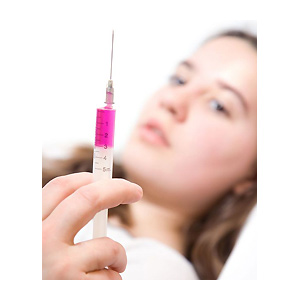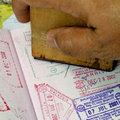Do I need travel jabs?
Off on holiday? Lucky you! But do make sure you check whether you need travel vaccinations before you go - or you could pay the price later on...

Whether you're set to rough it like Bear Grylls or swan round the world like a pampered Hollywood star, getting your holiday health prep wrong could see you landed with a lot more to worry about than just a common-or-garden tummy upset. However, travel immunisation advice can be confusing - not least because it changes on a regular basis.
Some diseases only flare up during the rainy season or just occur in certain parts of a country. Others tend to lurk in lakes, rivers, lowlands, forests or rural areas. To add to the problem, official guidelines may list travel vaccinations as 'usually advised' or 'sometimes advised' - leaving the all-important decision-making up to you.
Head to Bali on a five-star honeymoon, for example, and you won't need a Japanese encephalitis vaccination. But go backpacking off the beaten track in Bali's rural areas and you probably will.
So whether you need a full set of jabs or simply a first-aid kit depends not just on where you go, but also on what time of year, how long for, the type of travelling you'll be doing and your immunisation history.
The good news in all of this? Depending on your particular combination of risk factors, chances are you won't have to turn into a human dartboard before your trip. The bad news? Unless you plan well ahead, you could be leaving yourself open to nasty diseases that are long-lasting and - sometimes - life-threatening.
How far ahead do I need to book travel jabs?
Thanks to the UK's childhood vaccination programme, it's likely you'll only need a booster for some travel jabs - and a few of these can be taken right up until you're set to leave.
But the general recommendation is that you should visit your GP or travel clinic at least eight weeks before travelling - in case you do need a full course of injections, and to allow time for immunity to develop. Vaccines can take several weeks to become effective as they trigger the immune system to produce antibodies. See below for an idea of how far ahead to plan.
Spreading out injections over time will also spread the expense, as some travel jabs incur a charge. The yellow fever vaccination costs around £58 in selected Boots pharmacies, for example. Meanwhile, a course of malaria tablets can prove pretty expensive - particularly on longer trips.
Top five travel jabs...
Diphtheria
The disease: A highly infectious bacterial nose and throat infection that causes breathing problems. Left untreated, it can be fatal. It is spread by close contact with carriers - for example, by sharing water bottles or kissing.
Plan ahead: Children under 10 will receive their diphtheria vaccine as part of their childhood vaccination schedule. Children aged 10 or over and adults who have never been vaccinated will need to have three doses of the vaccine, one month apart. You can have a booster dose 10 years after this, followed by a second booster dose after another 10 years. You will then be protected for life. The vaccine is normally combined with other vaccines, such as polio and tetanus.
Tetanus
The disease: A serious bacterial infection contracted through cuts contaminated by soil or dirt. It affects the nervous system, leading to muscle spasms and possible death.
Plan ahead: Details as for diphtheria.
Polio
The disease: Poliomyelitis - to use its full name - is a highly infectious viral disease. It is spread by contact with human faeces, normally through contaminated food and water or person-to-person contact. It attacks the nervous system and can ultimately cause paralysis. Thankfully, it's now very rare. Over the past 30 years, only around 40 cases have been reported in the UK - the vast majority of which were acquired abroad.
Plan ahead: Details as for diphtheria.
Hepatitis A
The disease: A severe viral infection of the liver, most commonly contracted through the 'faecal-oral route'. This is when you eat or drink something that has been contaminated by the stools of someone infected with hepatitis A. It can also be spread through needle-sharing and anal sex. Symptoms include fever, stomach upset and pain, diarrhoea and vomiting. There is no treatment, only prevention.
Plan ahead: A single injection given two weeks before departure will protect you against hepatitis A for about a year. A booster dose, given six months to a year after the first, will protect you for at least 20 years.
Typhoid
The disease: This salmonella infection causes constipation or diarrhoea, fever, headache, stomach pain and a long-lasting illness that can be fatal. It's spread by contact with human faeces via contaminated food and water or poor sanitary conditions.
Plan ahead: Book your vaccine at least one month before you travel to allow your body time to develop immunity. One injection offers protection for about three years, after which you'll need a booster. Two types of typhoid vaccine are available in the UK. These either involve having a single injection or taking three capsules over alternate days. Neither offers full protection - so you'll need to take precautionary measures, such as only drinking bottled or boiled water.
Five more exotic travel immunisations
Japanese encephalitis
The disease: A mosquito-spread viral infection with, at best, no symptoms - and, at worst, brain-swelling, brain damage, paralysis or death. Immunisation is often recommended for longer stays and rural visits to Southeast Asia, the Far East and tropical north-east Australia.
Plan ahead: There is currently one vaccine available for Japanese encephalitis in the UK, for use in adults and children over two months old. It's given as an injection and requires two doses for full protection, with the second dose given 28 days after the first. This second dose needs to be given at least 28 days before travel. It still doesn't offer complete protection, so you'll need to take further precautionary measures while you're away. A booster dose can be given between one and two years after you're first vaccinated.
Tick-borne encephalitis
The disease: As above, but carried by ticks and found in forested areas in some parts of Russia, Siberia, China, Japan, Austria, Hungary, the Balkans, Czech Republic, Slovakia and Scandinavia. The vaccination is recommended for those hiking or camping in infected areas during late spring or summer. For details of current risk areas, consult the National Travel Health Network and Centre's map.
Plan ahead: For full protection, the vaccination requires a course of three doses. The second dose is given one to three months after the first, and provides immunity for about one year. A third dose, given five months to a year after the second, provides immunity for up to three years. The course can be accelerated, with the first and second doses given two weeks apart, if necessary. This provides short-term protection for nine out of 10 people. For continued protection, a booster dose can be given up to three years after the third dose. Boosters can continue to be given every three to five years.
Meningococcal meningitis
The disease: This bacterial infection causes blood poisoning and can be fatal. It's spread by close contact with an infected person. Vaccination is often recommended for backpackers in areas such as sub-Saharan Africa, Nepal, northern India or Hajj or Umrah pilgrimages to Saudi Arabia. There are multiple strains, so even if you've been vaccinated in the UK as a child, you may still need a travel jab.
Plan ahead: One type of vaccine protects against four strains of the disease for about five years. It should be given at least two to three weeks before travel.
Rabies
The disease: An incurable disease that infects the spinal cord and brain, leading to muscle spasms, a phobia of water, convulsions, aggressive behaviour and death. It's spread through an infected bite or scratch from a rabid animal - including dogs, bats, monkeys and cats - and is most prevalent in Africa, Asia, Latin America and South America.
Plan ahead: Two rabies vaccines are available in the UK. Vaccination usually requires a course of three doses across four to five weeks. The second dose is given seven days after the first. The third dose is given 21 or 28 days after the first, depending on which vaccine is used.
Vaccination should be completed before your departure to allow your body to develop full immunity. Booster doses are usually only recommended for people at high risk of rabies.
Yellow fever
The disease: A potentially fatal mosquito-spread infection with symptoms including headache, fever, vomiting and jaundice. It's only found in South America and parts of sub-Saharan Africa, but you may be required to have the vaccine in order to transit through or travel to certain other countries.
Plan ahead: Book your jab for at least 10 days before travelling to allow your body time to develop full immunity. One injection lasts about 10 years, after which you will need a booster.
Is there a vaccine for malaria?
Sadly, no - although potential vaccines are currently in clinical trials.
The World Health Organisation estimates that 30,000 international travellers contract malaria every year, with many falling victim to the myths surrounding the disease. So don't be taken in by travel gossip. The facts? Antimalarials can reduce your risk of malaria by about 90 per cent. Yes, you can still be infected in the dry season. And, for the record, gin and tonic sundowners won't stop you catching it.
Protection includes both old-fashioned bite avoidance and malaria prophylaxis.
Tablets include antimalarials such as Malarone (the brand name of a drug known as atovaquone plus proguanil) and Mefloquine (also known as Lariam), and Doxycycline (also known as Vibramycin-D), which is an antibiotic. These must be taken before, during and after entering the malarial zone - so plan ahead as some courses need to be started several weeks ahead of travel.
No drug is 100% effective, though, so do try to avoid getting bitten. Cover up - particularly between sunset and sunrise when the mozzies are most active. Invest in insect repellents, anti-mozzie room plug-ins and mosquito coils. And pack a good mosquito net: always check for holes if you're getting an old one out of the back of the wardrobe.
Avoiding bites - even in daytime - is a good habit to get into. Mozzies are the rats of the insect world and also carry diseases such as dengue and chikungunya - neither of which has a vaccination option.
Further information
This feature offers guidelines only. See your GP for proper medical advice and to check that you're up to date with your vaccinations.
You'll find more on travel immunisation at:
● NHS Fit For Travel: Up-to-date travel health information and news for people heading abroad from the UK.
● National Travel Health Network and Centre: Health advice by country.
● NHS Vaccinations Guide: Vaccinations advice for you and your family.
● World Health Organisation: Latest facts and advice on malaria
● MASTA: Create your own online health brief.
More useful travel tips...
The complete guide to holiday health
Do I need a visa? Ensure you can enter the country!
Currency converter: how far will your spending money go?










